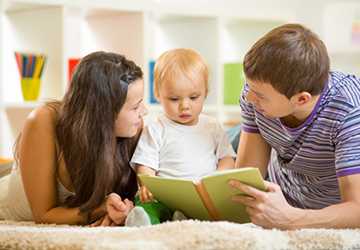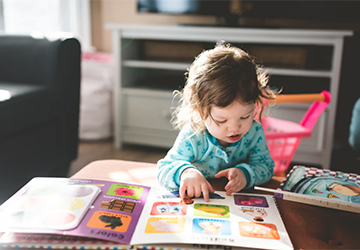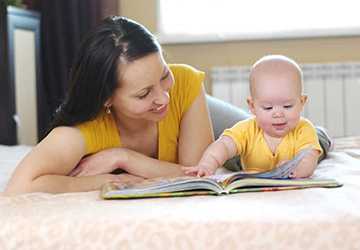When to Start Reading to Your Baby
Introducing your child into the world of literature is more than just making connections; it marks an essential step in their cognitive and emotional growth. Although the best age to read to your baby may seem unclear, research shows it's never too early. In this detailed article, you will learn about the benefits of reading valuable books to your baby and how developing this habit can significantly impact your baby's mental development and learning abilities.
Best starting age
Best Time to Take this Step
Exploring literature can begin as early as infancy. Undoubtedly, some things happen, but you can become brilliant if you put in extraordinary effort. The same applies to the language acquisition process. You can learn the basics by imitating those around you, but reading to your children from an early age enhances their innate ability to learn and grow. Your baby will gradually learn language and literary skills smoothly and accurately, even at a young age. It becomes the cornerstone of their language learning abilities and develops a good sense of analyzing and observing their environment. It develops their admiration for books, which becomes a valuable habit for them in the long run.

Why start early?
● Improve listening skills
● Accelerate language progress
The benefits of reading for young children
Engaging children through storytelling has many benefits beyond language development. It promotes the bond between caregiver and baby, enriches the senses, and sets the stage for educational and interpersonal success.
● Interpersonal and Emotional Growth: Narratives embrace a range of feelings and promote empathy and understanding.
● Intellectual Benefits: Introducing different vocabulary and ideas promotes intellectual maturity.
● Establish a routine: Reading time can be an essential part of your child's nighttime schedule and a time to relax and unwind.
How to teach your baby to read
Introducing your newborn into the world of books should be an enjoyable experience. You can make reading to your baby a daily routine with the following strategies:
● Choose books that are age-appropriate for you. Look for books with vivid images, easy-to-understand text, and appealing textures or sounds.
● Interact and engage: Use different voices for the characters, identify and name objects, and ask questions to spark your baby's curiosity.
● Create a reading schedule: Set aside a specific time each day for reading and establish a calming routine that your baby eagerly looks forward to.
Make reading a daily habit
Developing a regular reading habit requires patience and dedication. Here are strategies to easily incorporate reading into your and your child's daily life:
● Set a consistent reading time: Whether it's before nap or bed, keeping a consistent schedule can reinforce the common reading practice.
● Involve Every Family Member: Encourage siblings and other relatives to participate in reading activities to create an atmosphere of literary participation throughout the family.
● Expand your home library: Collect curated books for babies and toddlers so your child can choose books that interest them as they grow.
Challenges and Solutions
The benefits of reading to babies seem very attractive to parents, but sometimes they find it challenging to find time from their busy schedules to develop the habit of reading in their children. Here are common obstacles and how to overcome them:
Lack of time: Even a few minutes of reading can be beneficial. Look for reading opportunities throughout the day, such as waiting times or quiet moments.
● Keep baby busy: Choose interactive books; feel free to change books if your baby doesn't seem interested. Commitments may vary from day to day.
● Build a diverse library: To diversify your baby's reading materials without spending much money, use libraries and second-hand bookstores and exchange books with other parents.
Cultivate a rich language environment.
Promote linguistic diversity
Creating a rich language environment is more than just reading. The aim is to embed different languages and dialects into your baby's auditory environment. This exposure can significantly improve their language flexibility and appreciation of global cultures. It is consistent with the benefits of reading to young children, as reading to infants from their golden years exposes them to the rich sounds of language.
Multilingual books
Combining books in different languages is a great way to introduce reading to babies. It gives them the chance to experience the sounds and rhythms of multiple languages, even if you need to become fluent in them yourself. This approach harnesses the benefits of reading in young children by promoting early language skills and cultural awareness.

Personalized storytelling
While published books are invaluable, the art of personalized storytelling provides a unique dimension to your baby's literary journey. Creating stories about family, your baby's daily experiences, or even imaginative stories about toys can make the reading experience unique and tailored and perfectly illustrate how to guide your baby to read.
The Art of Choosing Books
Create a diverse bookshelf
The content and themes of the books you choose play a vital role in developing your baby's understanding of the world and showing young children the benefits of reading. Our goal is to create a bookshelf that represents the broad range of cultures, perspectives, and stories essential for reading from the best ages through to infancy.
Books to accompany children's growth
As your baby grows, his interests and level of understanding will change. Choosing books appropriate for different stages of development ensures that reading remains an exciting part of their lives, demonstrating the importance of knowing how to introduce reading effectively to babies.
Appeal to the senses
Beyond Words: Books for the Senses
For younger children, books that appeal to more than just their sense of hearing may be particularly effective. Books with different textures, scents and even integrated sound elements can provide a multi-sensory experience and enrich the reading process; this is consistent with the benefits of reading to young children and supports the idea that the best age to start reading to young children is earlier.
Conclusion
In short, the best age to read to your baby is as early as possible. Reading to young children has profound benefits that impact their emotional, social and cognitive development. Understanding how to introduce reading to your baby and make it a daily habit will help build a strong foundation for your child's future learning and development. Remember, excellence in the world of books begins with a story. Start the journey today and open up a world of possibilities for your baby.







